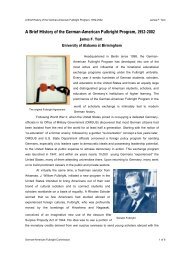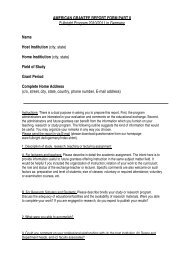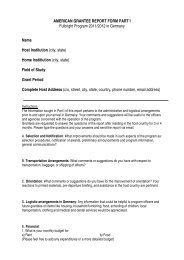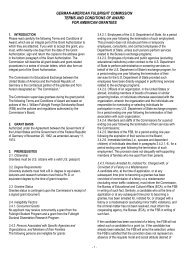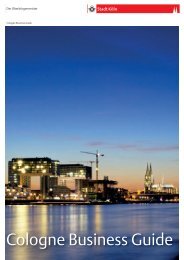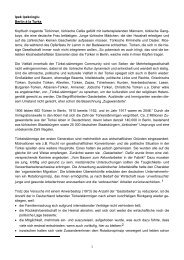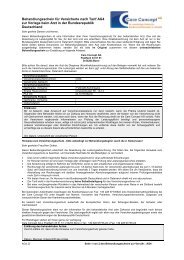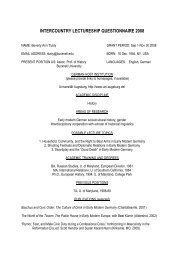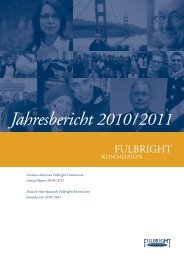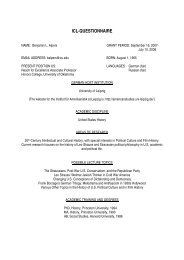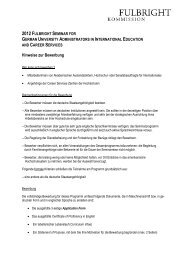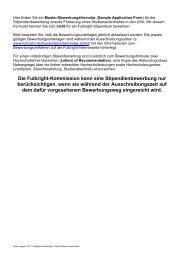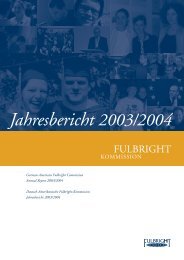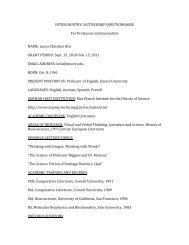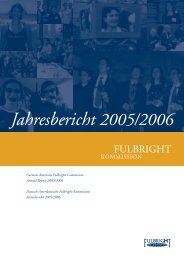The First Class of Fulbrighters - Fulbright-Kommission
The First Class of Fulbrighters - Fulbright-Kommission
The First Class of Fulbrighters - Fulbright-Kommission
Create successful ePaper yourself
Turn your PDF publications into a flip-book with our unique Google optimized e-Paper software.
Edward N. (Ted) Adourian was born in Philadelphia, PA in 1930. He received a B.A. at Dickinson College, 1953;<br />
was a <strong>Fulbright</strong> Scholar at the Free University Berlin, 1953-54; and then received a M.A. from Fletcher School <strong>of</strong><br />
Law & Diplomacy, 1955. Later, he served in the U.S. Army, 1955-1958; and then received an L.L.B. from the<br />
University <strong>of</strong> Pennsylvania, 1961. Adourian worked 40 years as a trial lawyer in southern New Jersey. He is past<br />
President <strong>of</strong> the Camden County Bar Association, Fellow in the American College <strong>of</strong> Trial Lawyers, and Adjunct<br />
Pr<strong>of</strong>essor <strong>of</strong> Trial Advocacy, Rutgers/Camden Law School. He is also currently “<strong>of</strong> counsel” to a law firm in Cherry<br />
Hill, NJ and a pro bono lawyer with the Jesuit Urban Social Team in Camden, NJ. He has been married since 1957<br />
to Ritva Luikko <strong>of</strong> Finland. Together they have two children.<br />
Edward Adourian in 1953<br />
Berlin, between Art and Reality<br />
by Edward N. Adourian, Jr.<br />
I ARRIVED IN BERLIN at the beginning <strong>of</strong> October<br />
1953, several months after Soviet tanks had crushed the<br />
June 17th revolt <strong>of</strong> the Stalinallee construction workers<br />
against increased work norms. At the time, there was no<br />
Wall, no Checkpoint Charlie, and the U-Bahn and the<br />
S-Bahn ran unhindered through all sectors <strong>of</strong> the city.<br />
After registering at the Free University, I found a small<br />
room for 40 DM a month in the third floor flat <strong>of</strong> two elderly<br />
sisters in an old, onetime upper-middle-class house in<br />
Grunewald: Schleinitzstrasse 6a. Before the war, the<br />
younger sister worked for the S. Fischer Verlag. <strong>The</strong> elder<br />
sister had emigrated to pre-revolutionary Russia as the<br />
young bride <strong>of</strong> a Russian oil executive. <strong>The</strong>re, she experienced<br />
the last years <strong>of</strong> Imperial Russia, WWI, the Revolution,<br />
and the subsequent advent and consolidation <strong>of</strong> Soviet<br />
communism. She was living as a widow in Kiev when the<br />
German army occupied the city and accompanied it when it<br />
retreated from Russia. She was in Berlin when the Russian<br />
army took the city. I learned more from these two wonderful<br />
old ladies than from all my pr<strong>of</strong>essors at university.<br />
Moreover, neither sister spoke much English, which helped<br />
my efforts to learn German.<br />
From a Haltestelle along Bismarckallee I took Autobus<br />
A10 to the Uni in Dahlem, where I attended lectures at the<br />
Meinecke Institute. For a change <strong>of</strong> pace, however, I occasionally<br />
went downtown to catch a lecture by Otto Suhr at<br />
the Hochschule für Politik. Unlike at my small Pennsylvania<br />
college, attendance at the Free University was never taken.<br />
Consequently, I very <strong>of</strong>ten took the A10 in the opposite<br />
direction into Stadtmitte, and from there, to all parts <strong>of</strong> the<br />
city. Almost every day and night I was somewhere interesting—the<br />
opera, a theater, a Kino 1 , or just along Ku’damm.<br />
BEFORE BERLIN, I had never attended an opera.<br />
Berlin had three great houses, one in the West and two in<br />
the East. <strong>The</strong>ir combined repertoire went from Monteverdi<br />
through Verdi and Wagner to Alben Berg and Werner Egk,<br />
and, at least in the West, everything was sung in German,<br />
including Verdi, Puccini, Gounod, Bizet, and Mozart’s Italian<br />
(DaPonte) operas. In my head I can still hear Dietrich<br />
Fischer-Dieskau’s Don Juan sing: “Reich mir die Hand, mein<br />
Leben, komm auf mein Schloß zu mir;” 2 or Sieglinde Wagner’s<br />
Carmen sing: “Nimm dich in acht!” 3 Karl Böhm <strong>of</strong>ten conducted<br />
as did Wolfgang Sawallisch. (Sawallisch is now in<br />
his last year as conductor <strong>of</strong> the Philadelphia Orchestra<br />
where my wife and I have a concert series.) Among the<br />
many other memorable singers were Elisabeth Grümmer,<br />
Inge Borkh, Ernst Krukowski, Helene Werth, Ludwig<br />
Suthau, and Sebastian Hauser. At the time, the West’s<br />
Städtische Oper was located near Bahnh<strong>of</strong> Zoo, and before<br />
the performances I stopped at Aschinger for a quick Malzbier<br />
und Erbseneintopf . 4 On the way home with the A10 there<br />
was sometimes another stop at Der Dicke Heinrich for a<br />
bratwurst. <strong>The</strong>re was also a Furtwängler Beethoven concert<br />
(one <strong>of</strong> his last) at the Titania Palast in Steglitz and a<br />
Beethoven’s 9th at the Sportpalast, where also the 6-day<br />
bike races were held.<br />
It took some time before my German was good enough for<br />
the theater, but better late than never. And what great theater!<br />
<strong>The</strong>re was the Schiller <strong>The</strong>ater, the Schlosspark <strong>The</strong>ater, the<br />
Renaissance <strong>The</strong>ater, and the <strong>The</strong>ater am Kurfürstendamm.<br />
Nor can I forget the Resi Bar, with its Lichtspiel 5 and<br />
Rohrpost, 6 or the Badewanne near Rathaus Schöneberg. I saw<br />
Werner Kraus in Der Hauptmann von Köpenick and in Vor<br />
Sonnenuntergang, Walter Franck in Richard III, and Werner<br />
Finck in Pygmalion. <strong>The</strong>re was Büchner’s Woyzeck on the stage<br />
(Drehbühne) at the <strong>The</strong>ater am Kurfürstendammm and many<br />
more productions, which I can no longer remember.<br />
An opera at the Staatsoper or the Komische Oper in<br />
East Berlin was usually preceded by a stop at the Café<br />
Budapest near Stalinallee. Once I stood all day in line in the<br />
cold in East Berlin for a ticket to see an aging Galina<br />
Ulanova dance Die Fontäne von Bachtschissarai. At the time, I<br />
didn’t know who Ulanova was, but my landladies said I<br />
shouldn’t miss it. I didn’t regret the six plus hours in the<br />
cold.<br />
IN THE SPRING AND SUMMER there was a<br />
Berliner Weisse mit Himbeersaft 7 on the Ku’damm, or a<br />
Schultheiss 8 at a Biergarten in a suburb. <strong>The</strong>n there was<br />
canoeing on the Wannsee with a Krankenschwester 9 from<br />
Charlottenburg and sailing on the same lake with a Studentin<br />
from Zehlendorf-West. I also have a memory <strong>of</strong> the<br />
Berliners going wild in early spring 1954 when Germany<br />
beat Hungary in the World Cup.<br />
On the radio there was RIAS. 10 I my head I can still<br />
hear; “Achtung, Achtung! Hier spricht RIAS Berlin, eine freie<br />
Stimme der freien Welt. Wir bringen Ihnen Nachrichten.” 11<br />
From the beginning, I was in the Kino several times a<br />
week. Everything was dubbed into German, and it was a<br />
great way to learn the language. I especially liked the<br />
French films, Lohn der Angst and Kinder des Olymp, among



